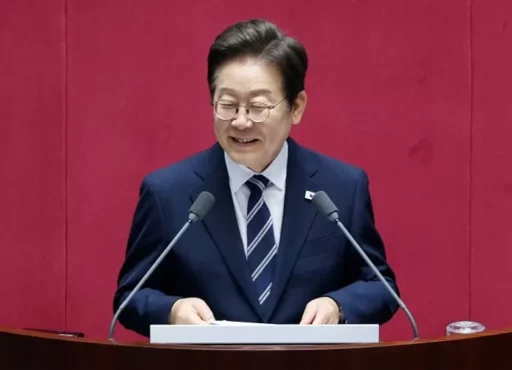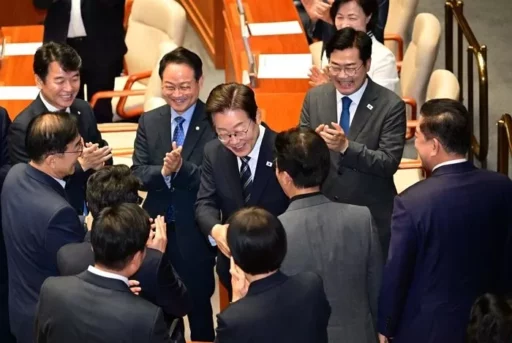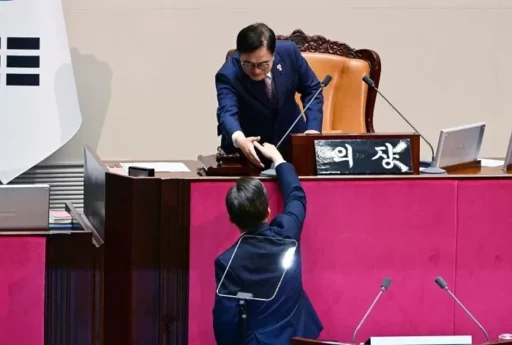Lee's Presidential Approval Rating "Doing Well" 62%… Up 9%P from Two Weeks Ago After Inauguration
A recent opinion poll revealed that President Lee Jae-myung surpassed a 60% approval rating for his governance just two weeks after taking office.
According to a nationwide survey conducted by Embrain Public, K-Stat Research, Korea Research, and Korea Research, involving 1,000 men and women aged 18 and older from October 23 to 25, 62% of respondents answered "He is doing well" to the question, "Do you think President Lee is doing well in his job?" The response for "He is not doing well" stood at 21%.
Comparing this to the previous survey conducted immediately after President Lee's inauguration (June 9-11), the positive evaluation increased by 9%P, while the negative evaluation rose by 2%P.
In response to a question regarding trust in governance, 63% said they "trust him," while 29% said they "do not trust him."

This is 9%P higher for positive evaluations and 7%P lower for negative evaluations when compared to the NBS survey conducted shortly after former President Yoon Suk-yeol's inauguration (third week of May 2022).
By political party support, 96% of Democratic Party supporters answered "I trust him," while 71% of People Power Party supporters answered "I do not trust him."
In terms of party support ratings, the Democratic Party of Korea received 45%, while the People Power Party garnered 20%. The Democratic Party's support remained the same as the previous survey, whereas the People Power Party's support decreased by 3%P. Support for other parties, excluding these two, is represented as follows: Reform Party 5%, Justice Party 4%, Progressive Party 1%.
Looking at key issues, regarding President Lee's nomination of Kim Min-seok as Prime Minister, 45% answered "He did well," while 31% replied "He did not do well." Those who answered "Do not know" or did not respond accounted for 23%.

Regarding the need for supplementary budget preparation, 61% indicated it is a "necessary measure," while 28% said it is "not a necessary measure."
When asked about the method of distributing the core element of the supplementary budget—support funds for livelihood recovery—responses were: "Differentiated distribution based on income level" (48%), "Selective support only for vulnerable groups" (27%), and "Equal support for all citizens" (21%).
On the question of debt relief for small business owners and self-employed individuals affected by COVID-19, 37% agreed with the notion that "the state should share responsibility for debts that have inevitably increased," while 59% opposed it, citing concerns about moral hazard and equity for those who have repaid their debts diligently.
In the survey regarding recognition of North Korea, 56% see North Korea as "a subject for reconciliation and cooperation," while 38% view it as "a subject of hostility and caution." Those responding "Do not know/No response" accounted for 6%.
This NBS survey was conducted via telephone interviews using mobile virtual numbers (100%), with a margin of error of ±3.1 percentage points at a 95% confidence level. The response rate was 18.3%. Further details can be found on the website of the National Election Survey Deliberation Commission.

Image sources: On the 26th, President Lee Jae-myung delivers the government's corrective speech regarding the second supplementary budget for 2025 at the 426th National Assembly (Extraordinary Session) 2nd plenary meeting. / News1, On the 26th, after concluding the corrective speech regarding the second supplementary budget for 2025, President Lee Jae-myung greets members of the Democratic Party at the 426th National Assembly (Extraordinary Session) 2nd plenary meeting. / News1, On the 26th, after delivering the government's corrective speech regarding the second supplementary budget for 2025 at the 426th National Assembly (Extraordinary Session) 2nd plenary meeting, President Lee Jae-myung exchanges greetings with National Assembly Speaker Woo Won-sik at the National Assembly in Yeouido, Seoul. / News1

![[Breaking News] Special Investigation on Rebellion “Yoon Seok-yeol Refuses to Enter Investigation Room… Attempted to Resume Afternoon Investigation but Raised Issues”](https://wordkorean.com/wp-content/uploads/2025/06/thumbnail-858.webp)
